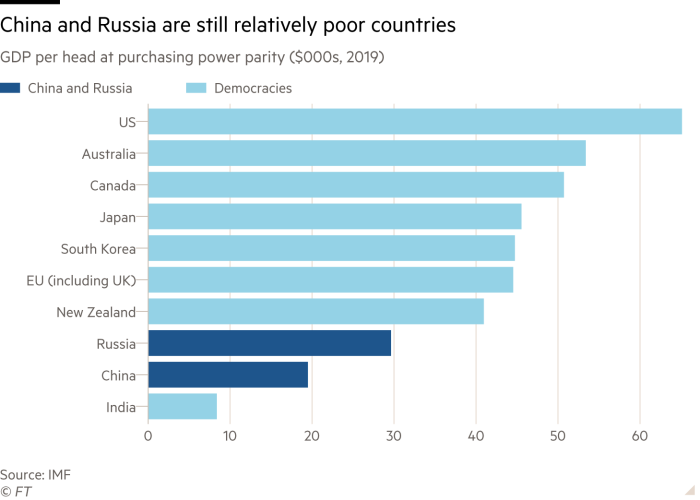The world falls apart as the US withdraws
An administration that cannot govern makes a stark contrast with China
Martin Wolf

© James Ferguson
Covid-19 has not transformed the world, at least so far. But it has accelerated its development, technologically, socially and politically.
This has been strikingly true in international relations: the divide between China and the west and the failure of US leadership of the west have both deepened.
The western-led world order is in crisis. If the US re-elects Donald Trump, this will be terminal.
China is increasingly assertive. It pays no respect to western pieties about human rights, as shown in the brutal treatment of the Uighurs and the new security law in Hong Kong. Under Xi Jinping, emperor for life, the assertion of China’s status as a superpower and a despotism is complete.
The abandonment of Deng Xiaoping’s celebrated advice to “hide your strength, bide your time, never take the lead” is unambiguous. Yet China must also be a partner in managing every global challenge.

The west has valuable assets in any competition for influence with China. Many still admire its core values of freedom and democracy. Western cultural and intellectual influence remains far greater than that of China.
The US has been able to create and sustain long-lived alliances of like-minded countries. If one adds together the nations that naturally align with the US, including those of Europe, Japan, South Korea, Canada, Australasia and, increasingly, India, their economic and political weight remains huge.
Yet things have fallen apart. The US has succumbed to fierce internal divisions that have ended up in a destructive zero-sum nationalism. Mr Trump is the embodiment of these divisions, as former secretary of defence Jim Mattis has asserted.
He is also the chief protagonist of his country’s rejection of its historic role as global model of liberal democracy and leader of an alliance of similarly inclined countries.

Mr Trump’s is a post-values US. It is also post-competence. Even when people around the world did not like what the US did, they thought it knew what it was doing.
The frightening success of the Trump administration in dismantling government has transformed that view during the coronavirus era.
This president and administration neither want to govern nor know how to do so. The contrast with China, for all the latter’s initial failures in managing Covid-19, is stark. In an article in The Atlantic, James Fallows describes the systematic dismantling of the world-leading US system of pandemic response.
But the failure was not just due to the crippling of the government. It was also due to the character of the malevolent incompetent who runs it.

The world has noticed. US prestige and credibility have been grievously damaged. It is symbolic of the breakdown in relations among the core alliance that the EU, which has gained incomplete, but real, control over the disease, is not planning to allow Americans back in, yet.
In a Foreign Affairs article, Francis Fukuyama argues that the foundation of any political order, quite obviously so in a pandemic, is an effective government. In an earlier work, he argued persuasively that the ideas of the rule of law and accountability to citizens through democratic political processes are founded on this: if the state does not work, nothing does.
The Trump administration appears determined to prove this hypothesis.

An alliance of liberal democracies dedicated to creating a counterweight to China in some areas, while co-operating successfully with it in others, is conceivable. But it will not happen if the US does not recreate itself as a functioning state led by a president who does not admire every authoritarian he meets. Harold James, professor of history at Princeton, has even written a gloomy article about “Late Soviet America”.
Yet modern China has weak foundations, too. Its state is unquestionably effective and its people hard working and entrepreneurial. But the absence of a rule of law and democratic accountability makes the state too strong and civil society too weak.
China did well when opening up to the world, as it did over the past four decades. But, if the world closes down, it will become harder for it to progress so rapidly.

In The Narrow Corridor, Daron Acemoglu and James Robinson explain the dilemma faced by an effective despotism. It can allow entrepreneurs off the reins, to enormous effect. But, without a rule of law, the result will inevitably be a tidal wave of corruption, which undermines the regime’s legitimacy.
The ruler may then pull on the reins once again, forcing people back into behaving. But it also risks killing off needed animal spirits.
This is probably what is happening to the Chinese economy today. Some people seem to believe that artificial intelligence and the reaping of vast quantities of data will allow central planning to replace the market. Nothing is less likely.
The driving force of change is the ideas inside people’s heads. No one can plan for that. People need the incentives to create new and challenging things. Will today’s more oppressive Chinese state nurture that?

On the one side, then, we have a rising despotic superpower, but one with real frailties. On the other, we have an incumbent superpower that has lost its way. I want western core values to succeed and flourish.
I want China to prosper, but not at the cost of corroding societies that uphold those values. I want humanity to manage its relations peacefully and its fragile world wisely. If this is to happen, the US remains the indispensable power.
The problem is not so much Mr Trump as that so many Americans want him to lead them. The western crisis is a crisis of values.
We can overcome it. But it will be hard.
0 comments:
Publicar un comentario